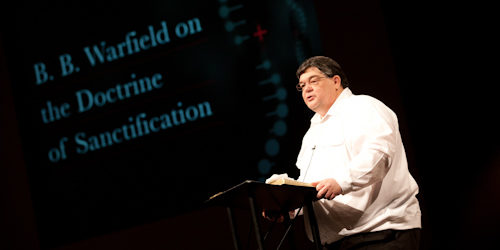
Warfield In Eulogy (Fred G. Zaspel)
Ninety-three years ago today — Feb.16, 1921 — Benjamin Breckinridge Warfield, “the lion of Princeton,” finished his earthly race and joined the church triumphant in the presence of Christ. His passing marked not only the end of his earthly life but the end of an era. It was Machen who remarked after the funeral that he felt as they carried Warfield out that they carried old Princeton out with him.
Warfield “the pugilist” had gained international attention as a Christian theologian utterly committed to the unfailing and unassailable truthfulness of Scripture — “God’s Word written,” as he was wont to describe it. His earliest known sermon, taken from Romans 3:4, set the tone for his entire career: “Let God be true, and every man a liar.” It is just the nature of the case that God is true, and all who oppose are mistaken and wrong.
With regard to all that is related to biblical and theological studies Warfield was more widely and deeply equipped than perhaps any man of his day, and deeply persuaded of his responsibility before God to “keep the deposit inviolate” (1Tim. 6:20) this famed Professor of Didactic and Polemic Theology from Princeton Seminary eagerly and devoutly brought all his massive learning against all who would dare challenge biblical teaching at any point. Even though he was despised by some for his unyielding and supposed “out of date” adherence to the historic Christian faith, he was a force for that faith that was respected on all sides. Records and reports of the day amply demonstrate that his contemporaries in biblical and theological scholarship would publicly express disagreement with him only with great care. Warfield was thoroughly committed to biblical teaching, and everyone knew it, and he was confidently able to defend it at every turn — and everyone knew that too! It is not for nothing that he has been called “the spoiler of liberalism.”
Underlying and driving eager confrontation of theological error was a heart that was hot for Christ and a soul deeply aware of his rescue from sin by a divine Savior. Critics of Warfield have depicted him as “afraid” that the old faith he held would lose out, and whenever I read this two things immediately come to mind. First, it is clear that these critics don’t share — and therefore cannot really understand — the “adoring” love for Christ that fueled Warfield’s defense of the gospel. It was not fear but passion that animated him. Frankly, to allege that Warfield was characterized by fear says much about the critic; it says nothing about Warfield. Moreover, so far from fearing the overthrow of the faith Warfield manifests everywhere, rather, the supreme confidence of one utterly convinced of the divine origin of Scripture. So completely persuaded that “What Scripture says, God says,” even the possibility of any teaching of Scripture being successfully contradicted seems never to have entered his mind. And so far from being afraid of scholarly “criticism,” he championed its right, insisting that a faith that cannot withstand the critics surely cannot save anyone. But precisely because Scripture is God’s own Word, Warfield was confident it would be vindicated at every point. Indeed, he fully anticipated the day when all “glass house” opposition will be shown to have been but “knowledge falsely so-called.”
We do not say that people in glass houses shouldn’t throw stones. We are glad they are throwing stones and we should be happy to encourage them in it. After all, the thing to do is to get the glass-houses all smashed; and this mutual stone-throwing is likely to accomplish that desirable end, and is therefore to be heartily welcomed by us. There is a house, not glass, built on the rock: when the stone throwing is all over it is likely that this house will be found standing alone.
It is with this supreme sense of confidence Warfield stepped up to meet all comers.
These are the leading characteristics of Warfield — a mind massively informed and driven by a heart aflame for Christ and a deep confidence in God.
On the evening of February 16, 1921, having lectured again, only a few hours previously, on the great love of God in Christ, he returned to his home where he breathed his last. Machen remarked on his passing that Warfield had done the work of ten men, and that there was not a man in the entire church who could fill one quarter of his place.
And yet it is to be hoped that his passing was not in every respect the end of an era. He modeled well those ideals that all who minister the Word should strive always further to attain. God does not give many the mind he gave Warfield, of course. And yet with all his intellectual faculties fervently and devotedly given to the service of Christ he exemplifies what ought to mark us all.
Fred Zaspel (Ph.D., Free University of Amsterdam) is pastor at the Reformed Baptist Church of Franconia, PA. He is also Professor of Systematic Theology at Calvary Baptist Seminary in Lansdale, PA. He is the author of The Theology of B.B. Warfield: A Systematic Summary and Warfield on the Christian Life: Living in Light of the Gospel.
